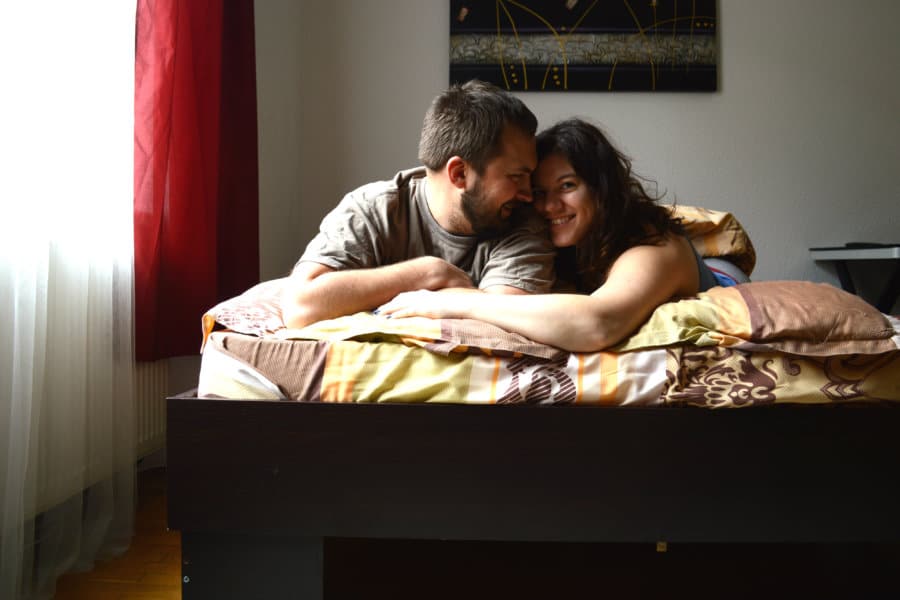
Even the strongest and healthiest of relationships are going to run into common relationship problems… but that’s okay, because we’ve got a rundown of the most common relationship problems that couples have, and what you can do to fix them!
Experiencing these common relationship problems doesn’t mean that your relationship is doomed, it just means that it is time to put a little more intentional effort into the weak spots. Learning more about relationships is never a bad thing, so take your time reading through this guide for how to navigate through some common relationship problems that couples face.
Money
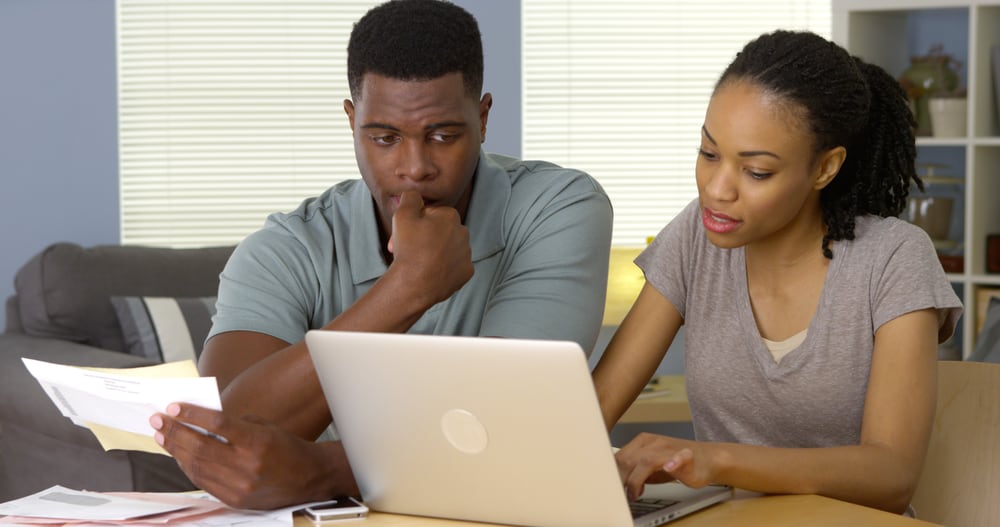
Often in the early days of a relationship, certain areas of our lives seem to be insignificant in the face of the new budding relationship; this happens a lot with money. Couples are so thrilled to discover each other and who they are together, that the less-glamorous parts of our lives are sometimes swept under the rug. Establishing healthy money practices as a couple is essential!
There are a variety of different ways that money can show up as a relationship problem, but the most common relationship problem related to money is a mismatch between the couple, often in the ability to contribute or in expectations around money.
The best way to counter this is to embrace transparency. What do you expect? What does your partner expect? You need to be able to have conversations about financial expectations openly and honestly, without judgment. We all bring our own ideas (and often baggage!) about money into relationships, so open communication is an important part of healthy money dynamics in relationships.
Trust
Obviously, trust is a biggie in any relationship, and it’s not just the high-stakes examples of trust being broken that can affect trust in a relationship (like infidelity or overpromising/underdelivering) but it’s also our own personal baggage and anxieties we carry with us from prior relationships that can get in the way.
To rebuild trust after a betrayal, it’s important to practice open communication about feelings and expectations moving forward; this will take time, effort, compromise, and often counseling with a couples therapist. Betrayal changes things and the relationship will have to change too. This might mean new standards for time spent together, how often relationship check-ins take place, and shifts in what each person needs to feel safe in the relationship.
When trust is threatened by a person’s personal anxieties or prior relationship baggage, much of the work must be done by the person experiencing the anxieties, but the other partner can help by providing more assurance. Some of the ways to sort through personal relationship anxieties and baggage are through self-reflection activities like journaling, meditating, therapy, and addressing specific behaviors like overthinking in a relationship. Working towards greater trust is never a bad thing!
Conflicts

Navigating conflict is a skill that doesn’t come naturally for many of us, so learning how to fight fair as a couple is an essential relationship skill that will come in handy throughout the course of both your relationship and your life! Learning how to engage respectfully and thoughtfully in heated moments has benefits that can extend beyond the relationship.
Conflicts often come with Big Emotions, so calm yourself down before they take over: take deep, slow breaths and remind yourself that you and your partner are on the same team. Stay in the present and don’t rehash old hurts or bring up other issues. Deal with one problem at a time; trying to solve every conflict that’s ever happened in your relationship will only lead to overwhelm and nothing will be solved.
If you find yourself in a toxic relationship or staring down some relationship red flags, it won’t matter how well you can navigate conflict. You can be as calm, respectful, and present as you have ever been, but if your partner is not, managing conflict and reaching resolution probably won’t happen. Not fighting fair is a major relationship mistake, but if you and yours are able to master the art of healthy conflict, you’ll be on solid ground.
Work-Life Balance
Work-life balance is important for everyone, but out of all of the common relationship problems, it might be one of the sneakiest. We live in a world where it is almost impossible to completely disconnect from work. We have emails, texts, calls, video conferences, and more that mean our “time out of the office” doesn’t necessarily mean time off. This is problematic when you are sharing your life with another because they want time with you, too!
Add in trying to coordinate two schedules and two sets of work expectations and time off together becomes even more important. If your “time off” together includes answering work emails and work texts, it’s not really time off, is it? If you’re not sure what your work-life balance is, take this quiz and/or ask your significant other what they think!
Every job will have different expectations, but ensuring you have time with your person where you both are completely “off” and giving each other some intentional attention is key to work-life balance. Whether it’s time spent together at home or on a romantic getaway, the most important piece is always your intentional attention. Your person wants to feel like they are important to you, too!
Future Mismatch/Avoidance of the Future
When two people first begin sharing with each other, the areas of disagreement can be easily glossed over because the agreements are more important, and that’s okay! Eventually, some of these things are going to pop back up, especially if they are Big Life Things, like if your partner wants kids and you don’t, or if your partner hates the idea of marriage, but you don’t.
If there are major mismatched expectations about the future, there is often some hope there that one person will eventually change their mind, and that is not likely with the Big Life Things like wanting kids or marriage or moving out of state or whatever the case may be. It’s not that you should be trying to convince your person to change their mind, but you have to both be on the same page about what the expectations are.
For example, if you are committed to having children one day and your partner isn’t, then the expectation might be that eventually, you both know you will need to break up so you can pursue a relationship that will support that. There are lots of topics that are important to talk about in committed, long-term relationships, but the most important thing is to know that you and yours are both headed in the same direction. How can you happily travel together if you don’t have the same destination in mind?
Intimacy
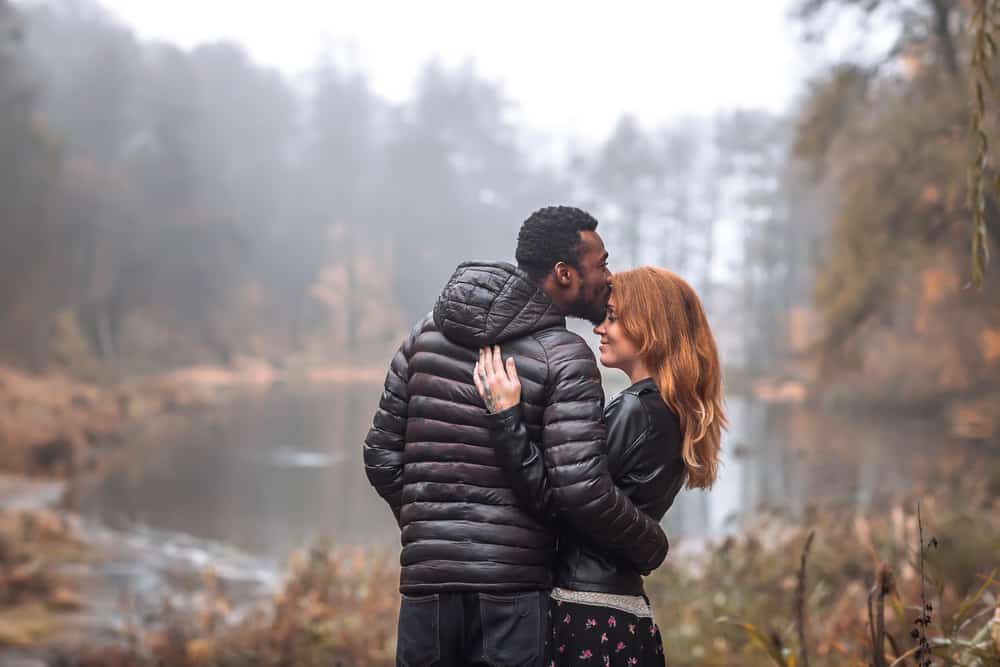
Intimacy (both mental and physical) is incredibly important in any long-term relationship, and often one of the things that can be easily pushed to the side in the everyday hustle and bustle of life. Luckily, there are so many simple (and fun!) ways to bring intimacy back to your relationship, and one of the easiest is to bring back the flirting!
Do you remember the early days of the relationship? All that playful, giggly banter back and forth? Bring that back with some flirtatious texts! There are ideas for flirty texts for her, flirty texts for him, even flirty Christmas-themed texts to get your wheels spinning, but really any little flirtatious text you can send your significant other to remind them that they’re still your person and you’re still theirs will work!
Sometimes you just need to spice things up a bit, and you can do this by traveling together somewhere new (couples who travel together have better sex lives), learning something new together, and of course, by mixing it up a little in the bedroom: fun and festive holiday lingerie, anyone? You can also consider hiring an intimacy coach to offer guidance specific to your own situation. There’s even a World Association of Sex Coaches directory you can search through to find your perfect coach: what a time to be alive, right?
Boundaries
Relationship boundaries often shift and evolve over time, but healthy boundary setting strengthens relationships. Maybe in the very early days, you two shared almost every moment of every day together because you just could not get enough of each other. The Honeymoon Phase is very sweet, but eventually, it’s natural to settle into a new phase of sharing life together that involves different time boundary needs.
There are many different kinds of boundaries: emotional, physical, sexual, financial, time, etc. The most important piece of having healthy boundaries in a relationship is communicating them. The way to navigate differing boundaries is to have an open, honest, judgment-free conversation. There has to be a clear agreement on both sides for what is acceptable and what is not.
Use “I-Centered” language, stating what you need and expect; let your partner do the same, and come together on what you both agree on, finding the sweet spots of healthy compromise on those that you don’t. Note the difference between healthy and unhealthy compromise: healthy compromise benefits both of you in some way without compromising feelings of safety. Unhealthy compromise makes someone feel unsafe or not listened to. That’s never a good thing.
Communication

Without healthy communication, even the strongest of relationships fall apart. Sometimes it’s the way we communicate with each other, perhaps with accusatory language or defensive reactions: “You never ___” and “No I don’t! I don’t know why you’re attacking me like this.” Neither of these is helpful. Healthy communication involves I-Centered language and slowing down to try to understand what is being said; you want thoughtful responses over rushed reactions.
When couples don’t have healthy communication, they can sometimes avoid hard conversations altogether, and that’s not an answer either. Luckily, communication is a skill that can be improved with practice. There are wonderful books on couples’ communication and great thoughtful conversation starters for couples that allow you to practice some of your communication skills, too!
There are other necessary means of communication too; do you know your partner’s love language? Do they feel your love the most through physical touch, or is their love language words of affirmation, where they need to verbally hear how important they are to you? Knowing each other’s love languages can ensure that you both are communicating your love to each other in a way that can be felt best.
External Stressors
As beautifully cocooned as we feel in our relationships, external stressors can throw us off balance a bit and challenge even the strongest of couples. This might be an exciting external stressor, like a promotion that requires a cross-country move, or a sorrowful external stressor, like a scary health diagnosis of a loved one. Stress is difficult to manage, and sometimes couples find stress drives them apart rather than together.
Talk about stress before it happens. Ask your partner to tell you about a time they had to deal with a stressful life event and what helped them get through it. Determine how you can incorporate this into your support practices for each other; does your loved one thrive on information to counter the unknown? If the external stressor is a move to a new state, maybe you can spend time together on the weekends looking up facts about your new home.
During a stressful event, take time for the two of you to slow down together for quality time. If your fun date night has always been dinner and a movie, but you’ve been too swamped supporting a loved one during a health crisis, bring the dinner and a movie experience in. Even if it’s just ordering a pizza and watching a movie on the couch together, your relationship will be able to handle external stress much better if you and your partner find ways to stay strong, together.
Connection

One of the most common relationship problems that all couples in long-term relationships will eventually run into is how to maintain connection. This doesn’t mean a couple loses love for each other, it just means that the everyday tasks of life have gotten in the way of some of the connection that committed, loving couples have.
Whether it’s been 5 or 25 years of committed partnership, there are some simple ways you can maintain connection: make Date Night a regular event, show your love and affection (even just a 30-second hug can boost oxytocin, the so-called “love hormone!”), have new experiences together, keep setting relationship goals together, build relationship rituals together, and practice preventative maintenance!
That’s right, preventative maintenance. Don’t wait until you and yours are in crisis mode to take care of the relationship. Relationship workshops, marriage retreats, and couples counseling are all fabulous ways of strengthening your connection and ensuring that your relationship is as close to crisis-proof as you can possibly make it! Connection in a relationship is absolutely essential.
All in all, as long as you are your person are committed to growing together, you will find that overcoming relationship problems can actually help you grow closer.
Read this next:
- 26 Relationship Myths and Why You Shouldn’t Believe Them
- 10 Rules for a Happy Marriage: How to Make Your Relationship Last
- How to Build Trust in a Relationship (Even if it’s Broken)
- The Best Thing About Being Married, According to Couples
- 7 Important Tips for Dating an Introvert
- 10 Common Signs You Might be Dating a Narcissist
- Top Signs of an Unhappy Marriage (and how to make it better)
- How to Be More Romantic: 12 Romantic Tips to Try TODAY!
- How to Fall Back in Love with Your Partner: Tips from 10+ Years of Marriage
- Right Person, Wrong Time: Signs You’re in a Right Person Wrong Time Situation
- Couples Morning Routine: Ideas and Inspiration for Morning Rituals
- How to Save Your Marriage: 7 Tried & True Tips for You
- Top 10 Relationship Green Flags for a Healthy Relationship
- 75 Perfect Sorry Messages for Him to Show How Much You Care
- 75 Sweet and Meaningful Sorry Messages for Her

Amy Hartle is the author of Do You Love Me? How To Stop Seeking Reassurance in Relationships, a book on reassurance seeking and relationship anxiety. Both her book and this blog are born of personal experience; Amy shares expert relationship advice from the lessons learned during her own 10+ years with her husband, as well as couples travel tips and romantic getaway recommendations, all gleaned while traveling the world together.
10 Jun, 2021 | Admin | No Comments
Do You Love Me? How to Stop Needing Reassurance in a Relationship

Do you find that you’re constantly seeking and needing reassurance in a relationship? That was me just a few short years ago.
Do you love me? How much? More than anything? More than anyone? Will you never leave me? Promise? What if you change your mind?
These were questions I put to my husband (then-boyfriend) Nathan at 26, 27, 28, and occasionally, at 29.
Finally, I can say that, for the most part, (at 35), I no longer ask these questions. I no longer seek constant reassurance of his love for me. I no longer feel insecurity in relationships. And the story has a happy ending. I got through this issue. We got through the issue together. We’ve now been married for 5+ years and we are in a better, more loving place than ever.
That’s not to say that I’m *completely cured.* While the constant need for reassurance may have gone away, now and again anxiety rears its ugly head and I find I’m reverting to old behaviors. Yep, it still happens. (See next: Anxiety in Relationships)
That’s because I’m a work in progress. Luckily, those moments of anxiety are never as intense or debilitating as they once were. I’ve developed the tools and resources to deal with them. And it also helps to have a tremendously loving (and patient) partner who learned how to help me feel more secure.
In so many ways I am free now from needing reassurance and I am far happier and more at peace.
But why was I like this? Why did it take so long to get over? What’s the story with looking for nonstop reassurance? And for others who are wondering how to feel secure in a relationship, what can you do to heal?
In this post, I’m going to tell you my story, how I discovered how to stop needing reassurance from my boyfriend and what has helped me grow. I have practical, real-world tips on how to stop seeking reassurance in a relationship, so buckle up and let’s dive in together.
PS: You’ll want to read this post next: What is Real Love? – A Practical Guide for Humans With Hearts
Relationship Reassurance – What’s it All About
The need for reassurance is actually a universal, human one. That’s good news. It means that looking for comfort and security are completely normal things that we all do.
It’s when that all that reassurance doesn’t actually reassure us that things start to grow problematic. We then fall into a pattern of asking the same questions over and over, seeking for the magic fix, the final answer or the one thing that will finally make us feel better. The thing that will finally make us feel secure.
But we soon discover that this kind of endless searching is in vain, and the demand for a balm for our anxiety is fruitless.
Reassurance seeking is not only limited to relationships. People seek reassurance for a range of concerns and through a variety of mediums. Some people seek reassurance from friends or family about their personal concerns.
Others look for reassurance through nonstop Googling, whether it be for health worries or any other issue. We sometimes think if we just research long and hard enough, we will find our answer.
Or in my case, if I ask my partner just ONE more time if he really loves me, I will finally feel secure.
Why do I need constant reassurance in a relationship?
This is a very personal story to share on the vast, boundless Interwebs, but I think letting others hear how it was for me could help them. If you’ve ever struggled with overcoming insecurity in relationships or wondered how to stop needing constant reassurance, I hope this post can be a comfort and help to you.
Your story might be something like mine. Or it might be totally different.
I’m no psychologist, but I know I had no deficit of love growing up. My mom loved me tremendously, was very affectionate, and provided for my every need. I never felt that I wasn’t loved or cared for.
My father passed away when I was barely 3 years old. I have no real memory of him or of his death, and to be honest, I have never felt ‘actively’ sad about it. It’s like hearing about the passing of a distant relative you never met. And my mom was an amazing single parent, so I didn’t feel the lack of a second parent. But perhaps that idea of loss was integrated into my impressionable brain. Maybe it contributed to my future abandonment fears.
I was what you’d call a sensitive child. Although I was nearly always happy, it didn’t take much to upset me and I cried very easily. I had a lot of fears and anxieties growing up and I hated conflict.
Not much changed over the years. I still hate conflict and will avoid it at all costs.
Somewhere along the way, I grew to equate conflict with a lack of love. I have no idea how this originated. If anything, maybe it was just my hypersensitivity that made me very much aware of people’s feelings and aware of the “what ifs” of life. Then, at 23, I had a painful, unexpected breakup with my boyfriend of 4 years.
I had discovered that someone could hide their true feelings from me and then suddenly be completely gone from my life. It’s highly likely this is when I went down the path of feeling insecure in a relationship, and when my reassurance-seeking started.

Why do I need reassurance in my relationship if it’s such a good one?
Nathan and I started dating in 2012, and it didn’t take long for me to start freaking out.
It didn’t help that the first year and a half we were long-distance. That situation can be so tough and wreak havoc on the mind of an anxious person. And while I move fast and am prone to jumping “all in” right away, Nathan is a much slower, more thoughtful person in relationships. He moved with deliberation and care. He wasn’t “sure” as quickly as me, and to my anxious mind, that was terror!
In a lot of ways, we came to the relationship from opposite ends of the spectrum.
Our attachment styles, personalities, and each of our own separate anxieties went head to head. He’s a major introvert. I’m an extrovert.
I was pushing. He was pulling away.
He is a person who needs time to sort through his thoughts; who doesn’t say anything unless he really means it. I am someone who needs constant reassurance (or at least I used to be) and I want it right now.
So as you might imagine, this led to some painful times. And despite those, we were growing closer and more in love.
But for me, it was getting worse.
Here I was with a sweet and loving partner who was there for me, living with me, choosing to travel the world with me, and so much more, and I could not stop questioning his love for me or asking for constant reassurance of his feelings.
You might be thinking, well, maybe your partner actually didn’t love you and wasn’t showing it to you. Or perhaps he was emotionally unavailable. Nothing could be further from the truth.
Sometimes, there may be very real signs that a person does not love or respect you in the right way. If a partner is continually dishonest with you, belittles you in public or in private, acts controlling, is verbally abusive, or doesn’t respect you, such things are fairly obvious.
These are clear relationship red flags and it is no surprise that you’d be unsure of your partner’s love. (Of course, with the blinders of infatuation on, these negative things can go largely unnoticed. A good tip is sometimes to ask your friends what they think. These people have your back and they will let you know if your partner isn’t treating you the way you deserve.)
But that was not the case here.
Even when I was at my most anxious, I was logically aware that Nathan was incredibly loving, generous, patient, kind, affectionate, and respectful. He never raised his voice in anger, never belittled me, never was cruel, and he never has been. He’s a genuinely amazing person.
Oh, and it is vital that I mention that Nathan gave me TONS OF REASSURANCE. That’s the problem with the cycle of anxiety and reassurance seeking. Even when Nathan was saying the very words I wanted to hear, and demonstrating his caring to me through his actions, it still wasn’t enough.
So even as I felt the anxiety of “does my partner love me”, I always knew it had no basis in truth. The relationship was wonderful. This is how I knew I had to turn inward to fix what was breaking down.
I no longer want to be the girl who constantly needs reassurance.
So how did I stop?
How to Stop Needing Reassurance in a Relationship
It sounds cliche, but the best way to quit constantly needing reassurance is to learn to love yourself.
I know that the idea of self-love can feel frou-frou. I’m not the type to stand in front of the mirror and hug myself and tell myself I’m beautiful and worthy. But I did have to take steps to learn to love and trust myself. And pretty much everything else on the journey flows from this one single idea. Let’s keep going.
Take time for yourself
Self-care is really important, and it’s essential on the path to self-love. You have to focus on your total wellbeing. From eating better to enjoying simple pleasures like hot baths and good books, to making sure to move your body once in awhile. These are huge ways to combat anxiety. When your mind is clear, there’s less room for the scary thoughts to come swirling around.
Turn inward
You have to spend time on your own. Learn to delight in your own company. Meditation is a great tool to use as it helps you stay grounded and allows you to examine what’s going on inside. I had to learn to take time to be quiet and centered. The distractions of everyday life definitely contribute to my anxiety when it flares up.
Give journaling a try
I love writing, and journaling about my fears and feelings was super helpful. This helped me dissect them (without asking for external reassurance) and allowed me to see the reality when I was stuck in my worries. It clearly demonstrated the facts and helped me see that I was feeling insecure in a relationship for no reason.
Learn Inner Bonding
Finding tools to help you is vital. Part of my journaling was a life-changing practice called Inner Bonding. Be sure to check it out as it can really make a difference.
For me, this entailed identifying and connecting with a few different “parts” of myself, including my Inner Child, my Wounded Self, and my Loving Adult. My Loving Adult helped me navigate my fears and insecurities and silence my fear-based Wounded Self.
Essentially, this was a way for me to become my own comforter, reassurance-giver, and wise spirit. Interestingly, the Loving Adult was there within me all the time, but only with contemplative practice did she discover how to come out and let me trust her. This step was probably the single most important thing I did to heal from my reassurance seeking.
Learn to trust again
Ultimately, while this was about me and my own issues, I had to take a look at the way I approached my relationship. I did this through journaling, self-reflection, and therapy.
I realized that I was so afraid of “what if’s” that I was failing to trust Nathan fully. And it didn’t matter that Nathan is the most trustworthy person I ever met. I had no cause to think he was planning to leave me or hurt me.
Love is scary and it is always a risk, but you have to be all in. You have to allow yourself to be vulnerable. Eventually, my brain caught up with my heart and I started to just put my trust in him more and more.
Figure out how to deal with uncertainty
Uncertainty is one of those things your anxiety latches onto so easily. It’s not uncommon to have those “what if’s” leaving you with feelings of insecurity in a relationship.
What if you or your partner dies? What if one of you cheats? What if you want a divorce? The simple truth is you cannot live your life wondering about what may or may not happen. All you can do is your very best with the information you have at any given moment.
And if your partner has shown himself to be a reliable, trustworthy, and loving person in the past, then by all probability, that behavior will only continue!
Despite the inherent uncertainty of relationships, when you decide to commit to someone, you just have to commit to working hard, loving through action, and sticking with your relationship through all its trials and tribulations. We wouldn’t need to take vows if we knew everything was going to be smooth sailing, would we?
Insecurity and anxiety go hand in hand, but you sometimes have to just take the leap. (Check out this excellent book Feel the Fear and Do it Anyway).

Develop skills for handling conflict
I found that one big contributor to my need for seeking reassurance was my fear of conflict. Ugh. My issue was that I viewed even minor tiffs as “conflict.” For some reason, I equated the idea that if Nathan got annoyed with me, he would leave me. It was totally illogical.
He was really instrumental in helping me with this, through his patience and his helpful way of reminding me even during arguments that his feelings hadn’t changed he still loved me. And I’ve since grown much more comfortable navigating any tense moments that arise. (Because they do. We’re human).
I can’t stress how important it is to learn to accept conflict as a natural part of a relationship. It’s not a “death knell.” It’s not a sign of something deeper. Normal, regular conflict is expected and healthy. When you start seeing it in this way, it becomes much less scary and far easier to actually deal with.
If you do find handling conflict to be a challenging process, don’t be afraid to get outside help. Resources online can help, like this one.
Discover what healthy reassurance means
Getting to a healthy relationship with the idea of reassurance is important. Just because you’re working to no longer need constant reassurance does not mean that you don’t need it at all! On the contrary, it’s smart to figure out what healthy relationship reassurance would look like for you.
Discuss the following with your partner:
What does reassurance mean in a relationship? In our relationship, specifically?
What are some examples of reassurance in a relationship that would be helpful to you?
What makes you feel loved? What makes you feel secure?
Find out your “love languages”
Building on the previous tip, figuring out you and your partner’s love language can be a huge help towards ensuring you feel secure and reassured.
Not knowing your love languages can actually contribute to the problem, because it can reveal unmet and unknown expectations.
I learned that I contributed to my own anxiety through my expectations. I am an extremely verbal person. I love being told sweet things, I adore written cards and letters, and a well-placed compliment never goes unappreciated! Surprise, my love language is “Words of Affirmation.”
But while my love language is words, that isn’t Nathan’s. And here I was waiting for him to pour out his adoration almost nonstop (very unrealistic). No wonder I was second-guessing his affections and freaking myself out. He thought he was showing his love in other ways, but I just wasn’t “hearing” it.
Together, we’ve worked to discover one another’s and to learn how to give love in the way the other person most needs and desires it.
By the same token, I’ve learned how to see love in the other languages, to notice that it’s always all around me, even when not spoken (although Nathan tells me he loves me many times every day).
The The 5 Love Languages is a great book and can be quite beneficial to any couple. Once we understood one another better, it was easier to give and receive love in many different ways.
Get My Book!
Did this article resonate with you? Want to go more in-depth with all this stuff? I’ve written an ebook just for fellow reassurance-seekers like myself. I’d love for you to check out my book Do You Love Me? How to Stop Seeking Reassurance in Relationships. It’s a quick read, but it’s packed with useful info, encouragement, and even excerpts straight from my own journal. You’re not alone, and you can totally get through this!
If you are finding yourself held back by a need for constant reassurance in relationships, I hope this post can show you that you are far from alone. This is a common issue among both men and women, but with patience, inner love, and self-discovery, it’s possible to heal from this anxiety and move forward. Perhaps it’s time you finally accept the beautiful love right in front of you.
You might also like these posts:
- Relationship Advice for Couples: 12 Principles for Lasting Relationships
- Relationship Rituals That Will Help Your Love Last
- We are Not Each Other’s Soulmates, But That’s Okay
- 15 of the Best Marriage & Relationship Books for Couples
- 7 Important Tips for Dating an Introvert
- 10 Most Common Relationship Problems (and how to fix them!)
- How to Build Trust in a Relationship (Even if it’s Broken)

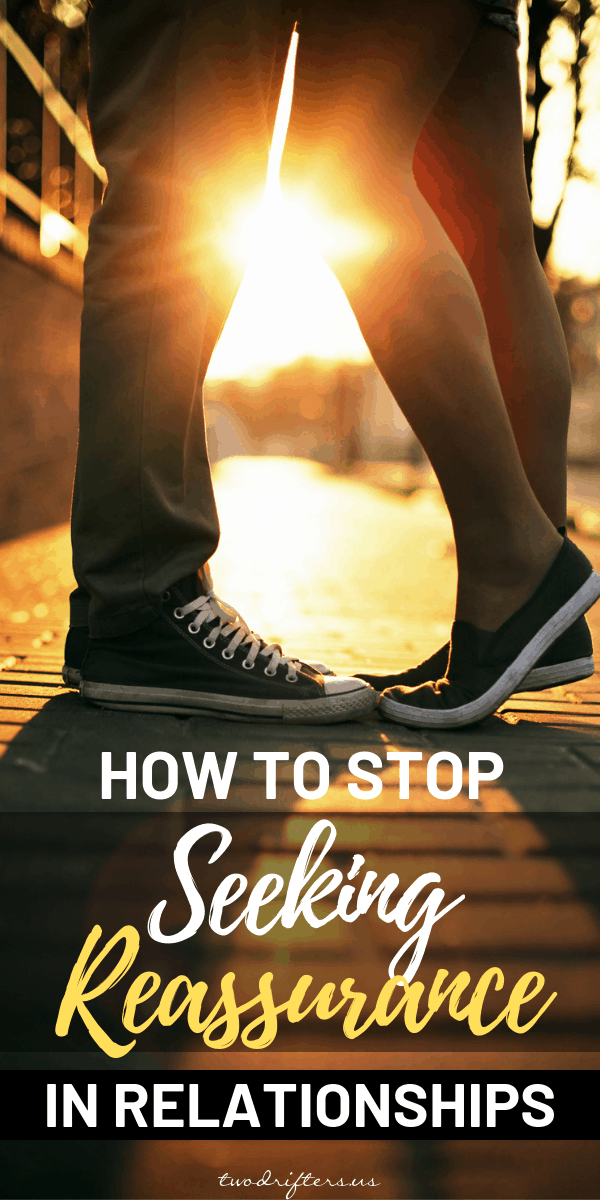
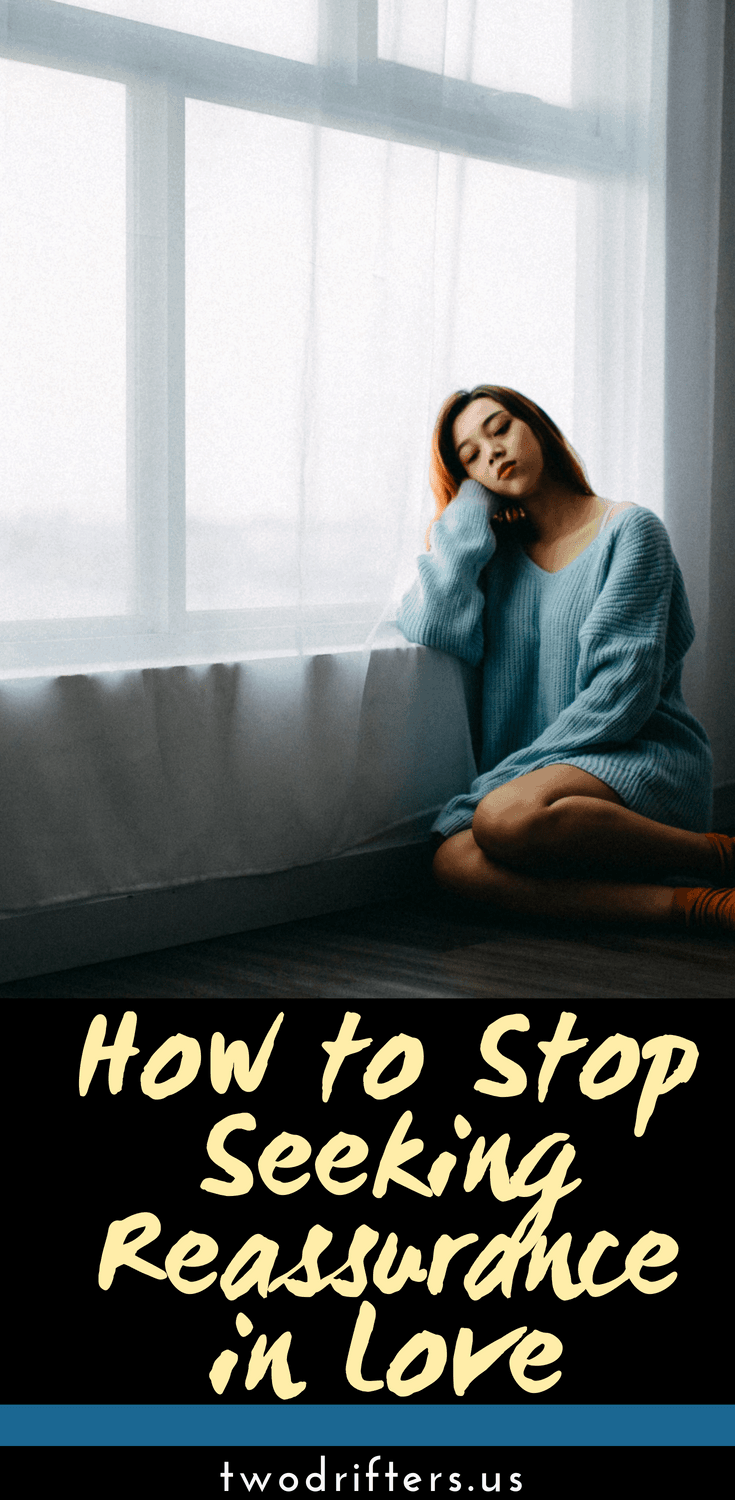
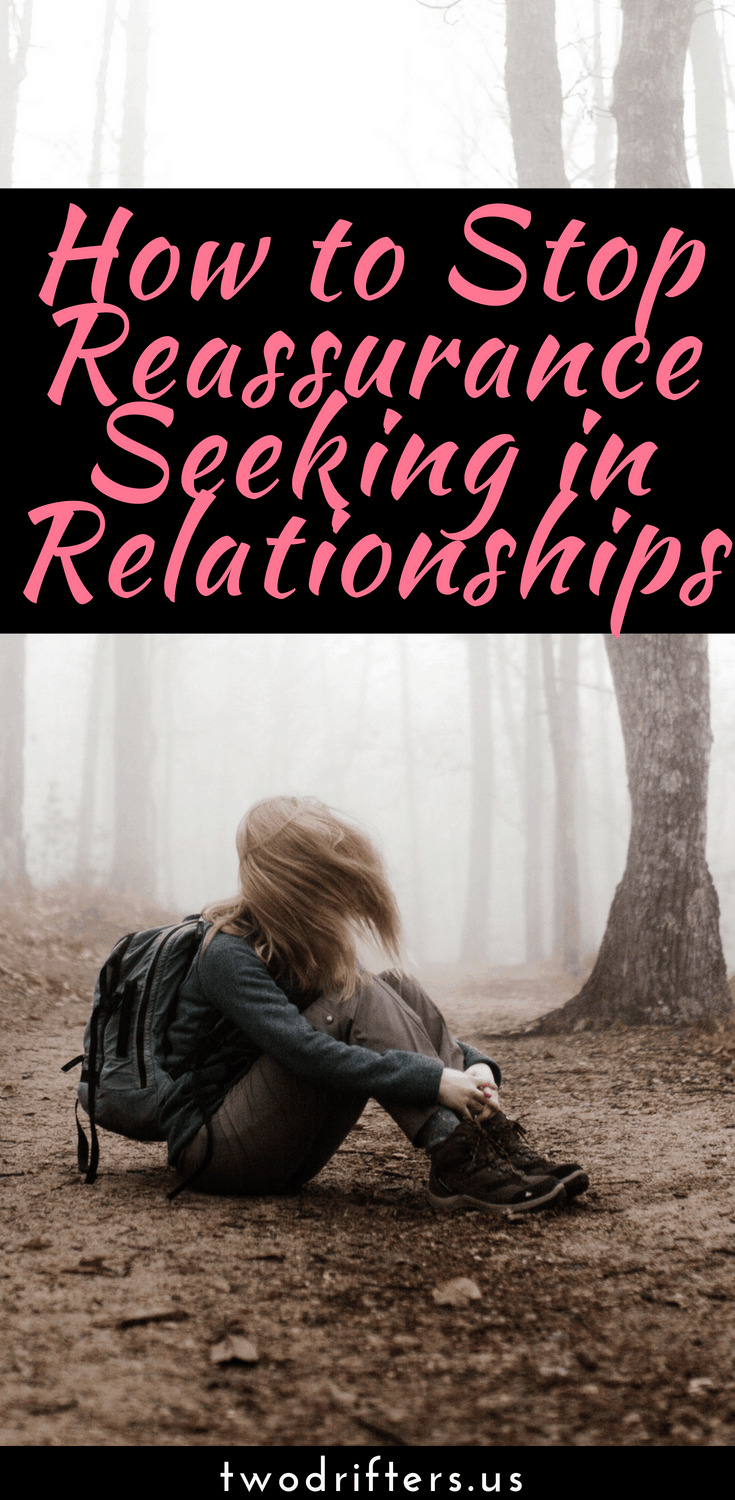

Amy Hartle is the author of Do You Love Me? How To Stop Seeking Reassurance in Relationships, a book on reassurance seeking and relationship anxiety. Both her book and this blog are born of personal experience; Amy shares expert relationship advice from the lessons learned during her own 10+ years with her husband, as well as couples travel tips and romantic getaway recommendations, all gleaned while traveling the world together.
Marriage is such a beautiful thing, isn’t it?
Two people deciding to commit to each other for the rest of their lives provides incredible security in addition to all of the other wonderful little perks of being married, and then as funny and as fickle as human beings can be, sometimes this security can start to feel a little… stale? Flat? Dare I even say… boring???
Don’t worry, we’ve all been there!
It’s only natural that relationships, just like people, can fall into a rut and need a little jump-start from the predictability of routine. If this sounds like you and yours, hopefully you will find some helpful ideas in the following 10 ways to spice up your marriage!
Go Beyond the I Love You
Saying “I love you” likely happens every day in very predictable situations: Before you head your separate ways in the morning, before you turn out the light at night, and as a standard sign off in your texts and calls. It’s a testament to the very strong feelings that two people can have for each other that “I love you” can become a phrase that is uttered as a reflex of sorts, with no need to think twice.
Here’s the thing though: Think twice! Because it is this automatic call and response routine in long-term relationships, it often loses a little of the impact and the oomph that it had when you and yours first uttered these words, right?
Get creative and bring the oomph back! Think phrases like, “I am so lucky to have you,” or “You still mean the world to me, you know that?” or any other special little phrase that you can sprinkle in where “I love you” used to predictably insert itself. Going beyond the I love you can make sure they are really and truly hearing the heat behind the love you’re slinging their way.
Get Physical!

At the beginning of a relationship, most couples can’t keep their hands off of each other, but as the years march on, it’s normal for physical affection to fall by the wayside as people get caught up in the day-to-day business of life.
This isn’t just about sexy time, either (although that’s super important, too!) because even just a short back rub or a loving caress of the hand is enough to release oxytocin, the so-called love hormone, and relationships in which couples touch each other often report higher relationship satisfaction.
Physical affection builds on itself, so set a goal of something like 10 meaningful touches per day with your spouse and see for yourself how you and your partner feel after a few days (and nights!) of intentionally amped-up physical affection.
Share Something New
There’s no doubt about it, sharing new and interesting experiences is bonding, but this can feel like a tall order when a married couple is caught up in the day-to-day routine of life. There can be a lot on the to-do list, but if there’s never anything new and interesting, this can be a sure-fire recipe for boredom in a long-term relationship.
In a world that is increasingly accessible by a few clicks of the ol’ mouse, it’s easier than ever to share fresh, new experiences! Maybe you both have always wanted to learn to ballroom dance; well, Zoom it up and get to dancing in the middle of your living room floor after dinner! It doesn’t have to be anything life-changing; it just needs to be something new that you and your spouse get to learn and experience together. Share something new and grow together so you don’t grow apart!
Mix it Up in the Bedroom
While it’s lovely to learn each other’s every little like and dislike and to create a perfect routine to express your love physically, and still lovely the 2,214th time you’ve danced this same dance, sometimes you’ve got to bust out some new moves! How funky you decide to get is entirely up to you and your partner’s comfort level, but keep in mind that the best way to get out of a rut is to step out of your comfort zone a bit!
Ask your partner to join you for a night of adult shopping from the comfort of your own boudoir and surf a few fun adult sites for goodies like lingerie and accessories. Have fun with it, you can find lingerie for every season… what’s more fun and festive than holiday lingerie??
You can also do a little redecorating of your favorite sexy-time space by adding some twinkle lights and candle votives for the perfect mood lighting, and if you’re really feeling bold, add some strategically placed mirrors nearby to add an extra dimension to the experience! There are many ways to build intimacy in your relationship, and mixing it up in the bedroom builds intimacy and passion!
See Someone Else… Together!

When you find a neutral third party who is well-versed in relationships and all of the patterns that people in long-term committed relationships tend to follow, you find answers to all of the Whys and How Comes of your relationship.
Why wait until the wheels come off to take the car in to be looked at? Get the oil changed, rotate the tires, and come home with tools, tips, and strategies that are perfectly tailored to your relationship and you’ll find that one of the easiest ways to spice up any relationship is to carefully care for and nurture it.
Travel Together
Traveling together as a couple is a great tool to strengthen marriages, but did you know that couples who travel together have better sex lives, too??? It’s true, we did an entire post about it here!
There are a few reasons for this, but at its core it is that when you go out in the world somewhere new together, you two are heading out in full on partner mode, ready to take on the world as the fabulous pair that you are. You’re sharing new and fun experiences, you’re not distracted by the pull of everyday responsibilities, and you’re building confidence as you adventure through the world together. You’re going to be even more in tune with each other after this, and any embers that needed fanning are likely to be back to a full-on flame!
Walk down Memory Lane
Want to ride the high of passionate love again? Stroll down memory lane by recreating some of your favorite shared experiences together. Instead of going out and physically doing those things again, grab a little piece of each one and stitch it all together for a unique date night.
Maybe you start off by having the funny podcast you both about died laughing to in the car that one time all cued up as you lead your spouse over to a bottle of the same wine you shared the first night of your honeymoon. Maybe off to the side is a baby gate with a stuffed cheetah and your cell phone behind it, because on your 2nd date you dropped your cell phone over the side of the cheetah enclosure at the zoo and now it’s a funny inside joke between you two about cheetahs and cell phones.
The whole point here is to share the memories of you two at your best because sometimes the jumpstart a relationship needs is for its participants to remember how great they really are together.
Prioritize some Playtime

Humans are playful creatures, but oftentimes we can let this part of ourselves go dormant when we get bogged down by the everyday tasks of life. Being playful is a part of what keeps us young and is crucial to friendship in marriage. When the playfulness in your marriage falls to the wayside, so do the associations you two have of each other as being a fun, carefree shelter for the other from all the external worries of the world.
Playtime can be both adult-themed or completely PG because both are important for maintaining connection and revving up that Wow Factor that you want your marriage to be full of! You can send fun and flirty text messages, surprise your significant other with an inside joke gag gift, or even just schedule yourselves a date night of watching some great stand up on Netflix with your favorite snacks.
Don’t take yourselves too seriously here: find a way to have fun together, and the more laughter, the better! Laughter gets your feel-good hormones flowing, so you’ll both be feeling great and associating each other’s presence with all those happy chemicals coursing through your blood.
Make their Dreams Come True
Okay, this might sound like a tall order, but hear me out! Most of us have lots of things on the Wish List of Life that are on the back burner, but a little movement going in the direction of dreams can have a big impact on increasing the passion levels in your marriage.
Maybe the dream is a foreign destination vacation that won’t happen for another few years; surprise them by downloading an easy-to-use language-learning app like Duolingo and practice together by exchanging flirty texts and watching films made in that language. Investing time and effort in each other’s dreams fans the flames of passion, big time!
Get a Better Game Plan with a Coach
If you two are ready to play but are still feeling a little bland, it may be time to call in a sex and intimacy coach. Sometimes a couple needs a little more of an individualized game plan to stoke the fire again, and that’s when you should call in a pro!
There are many advantages to working with an intimacy coach, including practical ideas and specific tips to help rev up the physical passion between you two. You can search Google or the World Association of Sex Coaches directory, and your physical intimacy pro is just a call or click away!
Every long-term relationship is going to go through periods where it seems like the spark is, well, just not sparking the way it used to! There are things you can do every single day to strengthen your marriage, but if you’re feeling like your relationship needs a little jumpstart, refer back to this list of 10 ways to spice up your marriage and get your spark back!
Read these next:
- 24 Ways to Keep Your Marriage Strong After Kids
- This Relationship Check-In Can Help You Rock Your Marriage
- 50 Christmas Pick Up Lines and Flirty Texts
- 7 Best Journals for Couples of All Kinds
- How to Manage Expectations in Marriage & Committed Relationships
- 75 Loving Text Messages for Her: Sweet Messages She’ll Love
- How to Fall Back in Love with Your Partner: Tips from 10+ Years of Marriage
- How to Save Your Marriage: 7 Tried & True Tips for You
- 25 Cute Outdoor Date Ideas for a Fabulously Fun Date
- Top 5 Things Your Husband Needs to Hear (and 25 Ways to Tell Him!)
- The Incredible Importance of Self Care in Marriage
- Affair-Proof: 7 Ways to Protect Your Marriage from Infidelity
- How to Build Trust in a Relationship (Even if it’s Broken)





Amy Hartle is the author of Do You Love Me? How To Stop Seeking Reassurance in Relationships, a book on reassurance seeking and relationship anxiety. Both her book and this blog are born of personal experience; Amy shares expert relationship advice from the lessons learned during her own 10+ years with her husband, as well as couples travel tips and romantic getaway recommendations, all gleaned while traveling the world together.
13 Jul, 2020 | Admin | No Comments
How to Flirt With Your Husband: 6 Ways to Kindle the Spark in Marriage

Have you forgotten how to flirt with your husband?
Or more likely, you know how but you’ve let it fall to the wayside.
You might think, I’ve already got my husband, what would I need to flirty with him? Maybe your lives have become some habitual that the idea of flirting at all just doesn’t enter your mind. This is so incredibly normal.
Even in a healthy relationship, you may be happy and content and feeling close to your husband, but you do miss that “spark” you used to have. In so many ways, flirting in marriage can be a kickstarter for intimacy and closeness. Flirting with your husband could be the simple key to recapturing some of that magic and to improving or enhancing your relationship immediately.
There’s a lot of talk about “keeping the spark alive” in a marriage or long-term relationship. That’s because the initial feelings of intensity and passion that usually characterize the start of a relationship don’t stick around forever. Sure, you’ll always meet those couples who seem to have unending passion, but the secret is, they are probably putting a lot of work into maintaining that passion! In other words, it isn’t easy to keep the flame of love burning, especially not if we’re trying to keep it burning as brightly as when we first met.
But the good news is, the flame of a marriage actually burns deeper and hotter. It may not be as easy to keep it cracklin’ (okay, have I used enough fire puns yet?) but it is so much more rewarding and amazing when you do. So flirting in your marriage is an essential if you want to make this happen.
If YOU are wanting to feel closer to your husband, turn up the heat, reignite the passion, then I’m going to give you a few simple ways to flirt with your husband. Maybe these are things you already do, or used to do. Maybe they are brand new ideas to you. Either way, I promise that when you make the effort to flirt with your spouse, good things will come.

Send your husband a flirty text
Probably my favorite way to get flirty with your husband is by sending a flirty little text message.
This is something you can do even on the busiest days, and it can have a huge impact.
Send your husband something that will intrigue him. A sassy compliment or innuendo is always well received. If you’re wanting to create anticipation for the evening together, you could drop hints of what you plan to do. Be as racy in your text messages as is comfortable for you. I’ve yet to hear of a husband who did not appreciate a suggestive or flirty text from his wife!
PS: Texts to your husband don’t have to be just flirty, either. They can be sweet and meaningful, and that says a lot about your love for him.
Talk him up in front of others
Complimenting your spouse in front of friends, family, or colleagues can be a real mood-booster. Especially when you’re in a group setting, don’t hesitate to say something awesome about your husband. This is when it’s okay to brag a little.
This kind of open praise or adoration reminds your husband that not only do you think he’s a great guy, but you also want other people to know it, too. You’re proud of him and proud to be his wife.
Being appreciated in public makes a person feel confident and desired. In other words, this is an excellent way to flirt.

Wear something special (or nothing at all)
Getting dressed up for your spouse is a simple and fun way to flirt with them! Whether you’re getting dolled up for a date night together or just decide to throw on a slinky little number to wear around the house, your husband is going to appreciate this.
Our spouses appreciate when we put the effort into our appearance, of course, because it is a reminder that you’re still wanting to impress your partner. This feels exciting and brings back those early day relationship feelings. And honestly, seeing your partner look their best reminds you of your attraction to them all over again.
So don’t be afraid to put on something special as a way of flirting with your man, and letting him know you love his attention.
PS: You might also experiment with a lack of clothing, as this is certain to get results!
Have an adventure together
My husband and I are big believers in having adventures together as a couple. You might be surprised that this is actually a great way to get your flirt on, too.
Doing something new and exciting together puts you in a different mindset and, depending on what it is, it may also throw you into new circumstances or surroundings (such as going on a trip together). This is great because it ignites all your senses and gives you a new awareness together. Seeing your partner in this fresh way and bonding over a shared experience tends to naturally ramp up your sense of fun and flirtiness.
Be generous with your compliments
A genuine word of praise never fails to be well-received, but it’s easy to forget to offer these words sometimes, especially in the daily life of a marriage. To flirt more with your husband, try intentionally offering more words of affirmation and appreciation.

Be generous with your touch
As with compliments, be generous with your physical touch, too. If you’re not in the habit of regularly cuddling, holding hands, or setting aside time to be together physically, make an effort to add in little touches here and there throughout the day.
Some ideas:
- Forget a peck on the lips on the way to work. Take 15 seconds in the morning to share a passionate kiss
- Touch/squeeze your husband’s shoulder as you pass him at home
- Give him a soothing back massage when you’re watching a movie on the couch
- Hold hands while you’re in the car/put your hand on his leg as he’s driving
Be generous with your touch and unexpected, too! The spontaneity of a sudden kiss on the lips or a smack on the butt can be a delightful surprise for your spouse.
Which of these ideas for flirting with your hubby do you like the most? What would you add?
Read these next:
- Relationship Advice for Couples: 12 Principles for Lasting Relationships
- How to Strengthen Your Marriage: 6 Simple Things to Do Every Day
- 5 Boundaries in Marriage That Will Actually Make Your Relationship Stronger
- 10 Relationship Rituals That Will Help Your Love Grow Stronger
- 5 Tried-and-True Tips For Building Intimacy in a Relationship
- 105 Cute Ways to Say I Love You
- The Incredible Importance of Self Care in Marriage
- Top 5 Things Your Husband Needs to Hear (and 25 Ways to Tell Him!)
- Affair-Proof: 7 Ways to Protect Your Marriage from Infidelity
![]()

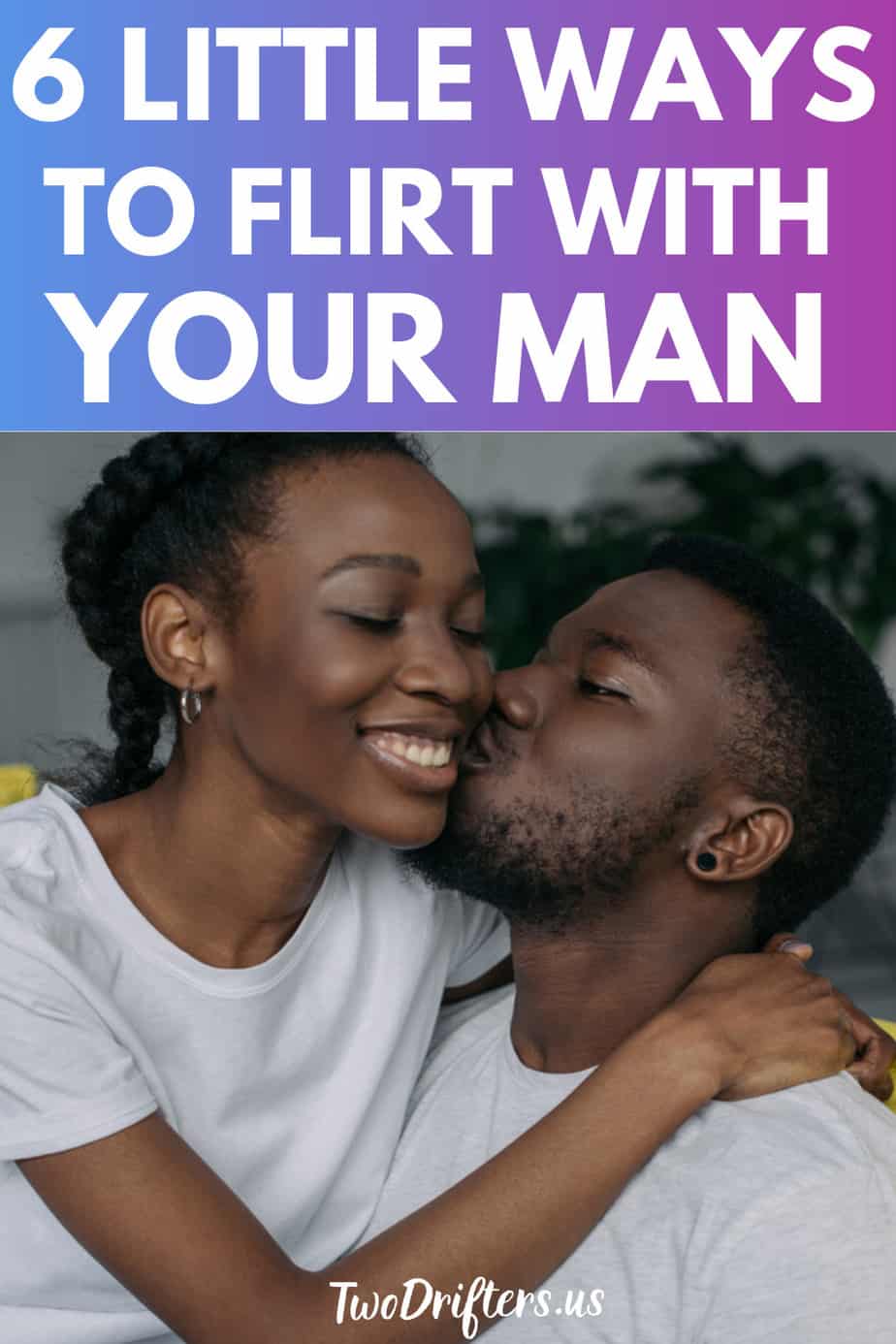


Amy Hartle is the author of Do You Love Me? How To Stop Seeking Reassurance in Relationships, a book on reassurance seeking and relationship anxiety. Both her book and this blog are born of personal experience; Amy shares expert relationship advice from the lessons learned during her own 10+ years with her husband, as well as couples travel tips and romantic getaway recommendations, all gleaned while traveling the world together.
10 Jul, 2020 | Admin | No Comments
Tips for Couples Counseling: How to Get the Most from Your Therapy

This post on tips for couples counseling was written by Alicia Sweyd, MA, LMFT
Who here remembers that romantic comedy with Kate Hudson and Matthew McConaughey? The one where they start dating each other to prove opposite points about relationships? How to Lose a Guy in 10 Days! Seriously, it is one of my most favorite rom coms! Not gonna lie, I actually reference it in my counseling sessions with couples regularly. But it get’s my point across very effectively! If you haven’t seen the movie, or haven’t watched it in a while, stop what you are doing and go stream it! (Or if you are old school like me, grab your dusty old DVD player and plug it in!) Full disclosure, this article has a few *SPOILERS*.
I want you to remember the part where they get into a big fight, and Matthew McConaughey’s character suggests they go to “couples therapy”. He even struggles to get the words out he is so grossed out by the concept. Next scene, they are with Kate Hudson’s friend (played by Kathryn Hahn) pretending to be a therapist. And she is PLAYING. THE. PART. The deep, soothing voice. The dark clothes. The glasses. The sexual inuendos. Hahn has got it going on in this scene!
Now, let’s be honest. When you hear someone suggest couples counseling, you picture this scene. Maybe not as insanely comical, or not as intense, but very close to it. I did! I thought all therapists needed to fit the stereotype. And I thought all couples had these crazy outbursts that got out of control. (To be honest, I think even my husband still thinks this is what it looks like!) And I know quite a few couples who connect with me for couples sessions have this belief, as well.
But this is far from the truth! Yes, sometimes sessions can get intense for couples who are dealing with some very difficult challenges. Yes, some therapists can match the stereotype. BUT NOT ALL! Not all sessions are intense. I have had plenty that were filled with laughter and joy, some tears of compassion, and allowed for the couple to grow deeper than they had hoped. Not all therapists are the stereotypical glasses and shawl asking, “And how do you feel about that?” I had a therapist covered in tattoos and piercings who was eccentric and lively.
The cool thing about counseling is that you get to decide what you want it to look like, and how you want it to help you and your partner. And I have a few couples counseling tips for you here: how to get the most out of your couples counseling sessions.
Be honest.
Be honest with yourself. Be honest with your partner. Be honest with your counselor. Just be honest!
I can’t begin to tell you how many issues people faced in the sessions could have been resolved moths prior if people had been honest with me or themselves. Sometimes, you may find yourself feeling uncomfortable telling your counselor you don’t want to try something because they are supposed to be the “experts”. I’m going to tell you a little secret about therapists and counselors, some of them may not want you to know this, but here it goes: We are NOT mindreaders. Phew! There! I said it! We cannot read your mind to find out if what we suggest is the best option for you. We need your honestly to help us help you best.
Also, you need to be honest with yourself. Admit when you have done something that didn’t help your relationship. Admit when you have been hurt by something your partner did, even if it seemed small. I’m not saying you need to make a huge deal out of it, or that you even need to bring it up with your partner or counselor. But you do need to acknowledge it for yourself. If you can’t admit the truth to yourself, if you refuse to clearly see your own perspective, then counseling will only help a little instead of a lot.
Have an open mind.
So many of the struggles faced by couples stem from the inability of one or both partners to be willing to consider an alternate perspective.
Your story has validity. So does your partner’s story. Both may have some validity and still not have the whole truth between the two. That’s where a counselor can come in to help. The counselor can help you see all perspectives, and find out where the root of the problem is, so you can move forward and strengthen your relationship.
You may have said something that hurt your partner. You didn’t intend it, so they shouldn’t feel hurt, right? Wrong. Intentions are a piece of the puzzle, results are another piece, and finding a way to communicate better is another piece. But you can’t complete the puzzle without all the pieces. So this is where having an open mind can help you get the most out of counseling.
Understand that your counselor has lots, and I mean LOTS, of information.
Oh my gosh. Can I just tell you how may books I have read about couples issues? I have read quite a few on ways of approaching couples counseling, theoretical books. I have also read SO MANY books that are self-help for couples. Lots of tangible tools and guides for engaging with your partner. It’s like having an encyclopedia of information just about the different ways I can help couples strengthen relationships.
But guess what? That means I am searching the database of my brain each time I talk with a couple. “Oh! Fighting about chores! I remember this from books X, Y, and Z! Now which one do I think will help this couple most?” And then I make a hypothesis about what tool will best help this couple. Go back to fifth-grade science. Do you remember what a hypothesis is? Guess. No, I mean, like that is what it is. A guess. It is an educated and well-informed guess, but a guess none the less.
Now, for those of us with lots of couples counseling experience, we will find a “good enough” or even “excellent” solution 90% of the time. But sometimes, we don’t guess right. And that’s okay! We have more! Let me try this other one!

But wait! What if I give you my best guess as to what solution would help you, and it’s wrong, but you and your partner aren’t honest? Well, I can’t share my other ideas with you, because I don’t want to overwhelm you with too much information and cause you to become confused. This is where that honesty comes in your favor.
And if you want more information, ask! You can ask why they think this will be the best fit. You can ask where the idea came from. You can ask if it is based on decades of research from relationship institutes, or if it is based on a book that some people found helpful. Ask questions! We love to share the information!
You are the producer of your counseling experience.
You and your partner are paying a pretty penny for your sessions with a counselor. IT IS WORTH IT! TRUST ME! You are getting personalized, individualized service from a person who knows more about your concerns that you could read about in a year. Their experience and education is what you are paying for. Now, you could go out and get the education and training yourself, but it would take you a lot longer. Plus, it would cost you a lot more to go through the process yourself. Hence, the counselor.
But you are also producing the work. Like with a film, the producer decides who to trust. The producer hires a director they think will be the best for the film. They trust that the director will create the vision the producer is hoping for. But if the director is not doing the job the way the producer wants it, they can tell the director to change directions. You can do the same! If your counselor is approaching an issue that you feel is out of context or is not the root problem, you can ask them to focus on something you think would be more helpful. You are the expert on you, your counselor is the expert on counseling, which is not a “one size fits all” system. So, share what you are experiencing, what you are hoping for, and how your counselor is helping or not so that you can get the most out of your counseling sessions.
Find a counselor that fits YOU.
Remember how I said that some counselors fit Kathryn Hahn’s stereotype of the shawl and glasses with the deep voice? I also said that a therapist I had was covered in tattoos and piercings and was a character. The spectrum of personalities for counselors is broad, to say the least. Mrs. Tattoos was the best fit for me. I also tried a therapist who fit the “glasses and shawl” stereotype, but it wasn’t a good fit. For me personally, I need someone who is eccentric and playful, someone who allowed me to see the dark humor in the struggles I am facing.
Take your time in searching for a counselor. Read bios, ask them if they offer a free consultation so you can see how comfortable you feel talking with them before you start sessions. Get a feel for how they talk with you, how they listen to you, and see if it is comfortable for you.
When finding the counselor for you and your partner, consider a stoplight. Red means absolutely not, no way, no how, don’t think I could ever feel comfortable with being vulnerable. Maybe the counselor was too abrasive or not assertive enough, maybe the counselor reminded you of that guy you used to work with who was a total butthead. It doesn’t matter exactly why, but if you don’t feel comfortable sharing your deepest struggles as a couple, you won’t progress much in counseling sessions. Yellow means maybe, I’ll need to try it out more and see. Then give yourself a couple of sessions to see if they are a good fit for you both. If yes, awesome! If not, keep looking. And green is totally 100% YES, I could probably feel comfortable telling this person all about my kinky side and not feel judged. Use the stoplight as a tool for you and your partner to find a counselor you both feel comfortable with.
The biggest take-away I hope you have is to know that COUPLES COUNSELING IS FOR YOU! Take your time in finding a counselor who fits your personality, be open minded and honest when approaching sessions with your partner. Understand that your counselor is here to help you, and they want to help you in the best way possible, which requires your input as well. Couples counseling will help you and your partner grow deeper and closer, as long as you take advantage of it. You’ve got this!
About the author: Alisha Sweyd is a Licensed Marriage & Family Therapist in Pacific Grove, California. She works with couples from all walks of life. Alisha especially enjoys getting couples to connect and build a strong base from which to grow and enjoy their relationship together!
You might also like:
- 7 Couples Communication Books That Will Transform Your Marriage
- 9 Therapist-Recommend Couples Communication Exercises
- 26 Common Relationship Myths You Need to Stop Believing Immediately
- 10 Common Relationship Problems (and how to fix them!)
- How to Fall Back in Love with Your Partner: Tips from 10+ Years of Marriage
- How to Save Your Marriage: 7 Tried & True Tips for You
- How to Build Trust in a Relationship (Even if it’s Broken)
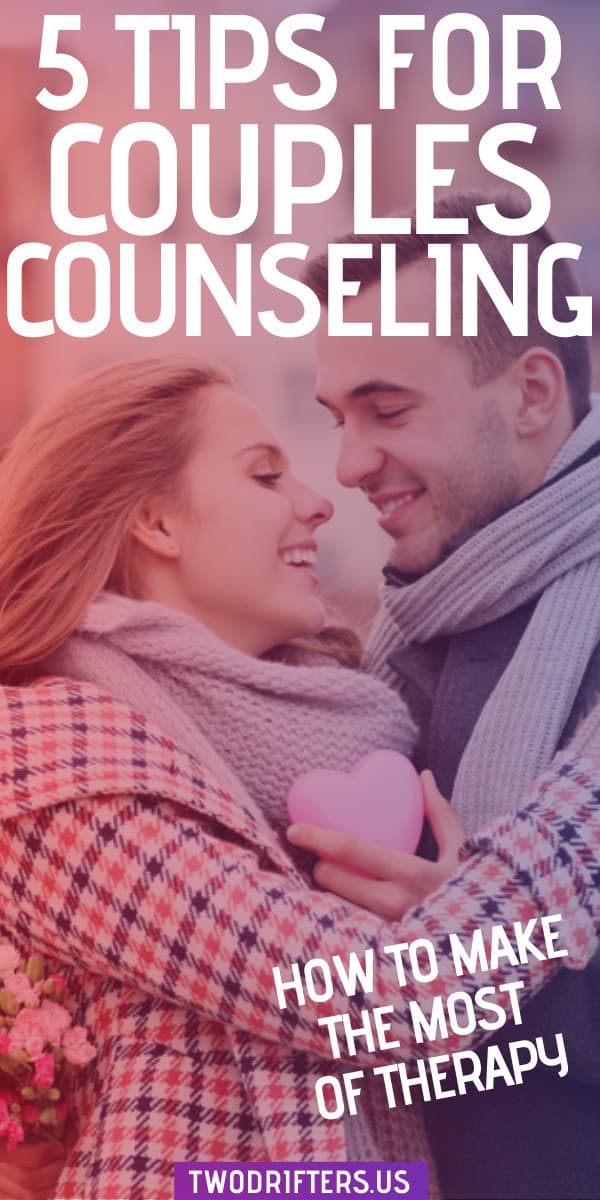
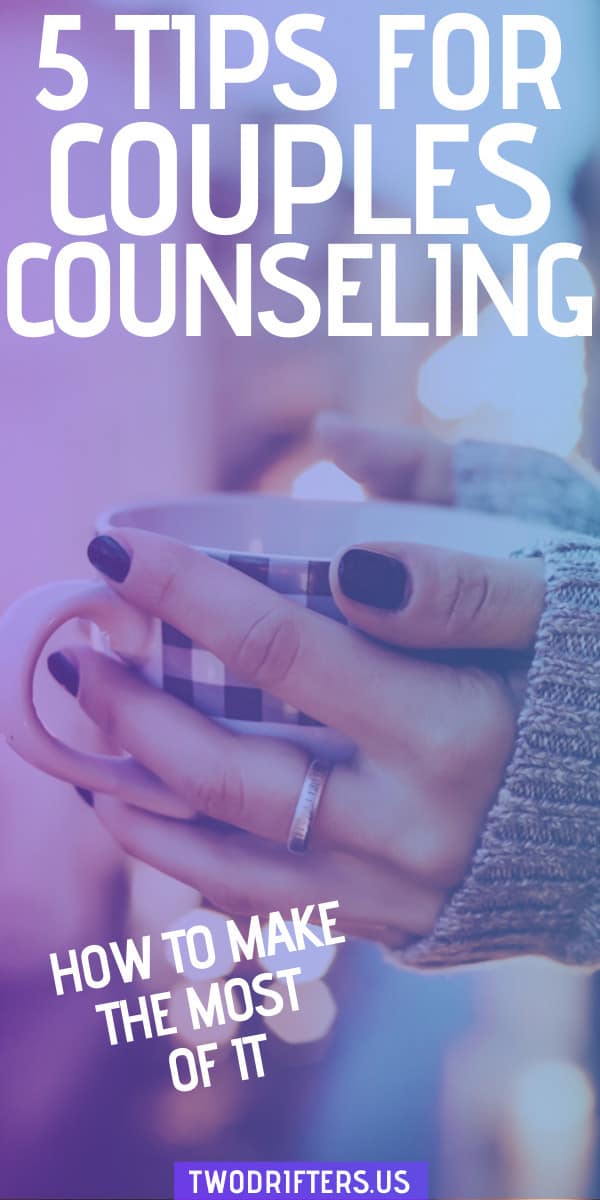
Looking for ways to build intimacy in a relationship? This post will help you!
If you want to know how to make a relationship stronger, I have something to share. Intimate love goes deeper than a surface connection, and creates a space for you to reconnect emotionally with your partner with every touch. If you want emotional closeness, being intimate is a huge part of how to strengthen your relationship.
This piece was written by Ashley of Mama Says Namaste.
The Love-Making Myth
Once you’re married, you make love all the time. Right? That’s what I thought, at least. One day, when I’m in a committed relationship, we’ll roll in the sheets all day in pure bliss, and the rest of the world will wait.
Yes, I sense your skepticism. There are too many jokes about how intimacy stops when you commit to someone. Regardless of whether it’s a traditional marriage, common law or simply a committed relationship, I have news – intimacy is not automatic. Can you learn how to strengthen your relationship by how to be more intimate? Why yes, yes you can.
Unfortunately, there are many relationships where intimacy of any kind just doesn’t happen. A random handhold over a prayer may be as close as a couple gets. Once in that rut, it’s hard to get out of it. And soon enough, you find yourself living with a roommate or companion. It’s nice enough, but it’s not an intimate relationship. How to be in a relationship with intimate love is possible.

The Sex Challenge
Back in the beginning of our marriage, we had our ups and downs with intimacy, until we hit a crazy turning point. At this time, we had one toddler and were ready to start trying for another. My husband Nathan was more than willing to “practice” for having another baby every night!
As we debated on how much sex we really had, a challenge popped in my head. Now, if you know anything about personality styles, this is an essential foundation for motivation. For me, I love a good challenge. So my husband thinks we don’t make love enough? Fine – 7 day challenge accepted.
We’ve heard about the 7 days of sex challenge, and we figured that was a piece of cake. So we did it. And then we added another week. And another, until we hit a full 365 days. And we kept going.
And yes, our middle child is now 8 1/2 and my youngest is 5. We’ve added two more kids, so in the midst of having babies and toddlers in our home, we somehow managed to have sex consistently almost every single night!
Seriously. Nine Years.

How To Make Your Relationship Stronger
Now yes, let’s not get too technical – we allow for grace. We may not make love every single evening anymore. But who’s to say morning or afternoon should hold us back? And then there are those days when it happens twice, and we may take a break. Intimate love is critical for our emotional closeness – and prioritizing it is one of the #1 pieces relationship advice for couples.
Yes, my friends, you’ve heard me correctly. For the past nine years, through two pregnancies, we’ve averaged making love at least 5 times a week, every week.
Before you tell me I’m absolutely crazy, I’m going to let you know why this is important, what it’s done for us, and how you can create your own intimacy connection.
WHY?
Before you write this off as absolutely ridiculous, hear me out. Making love every day may not work for you. We happen to both be high energy, active people. You burn a lot of calories during lovemaking, and it’s an endorphin rush we love adding into our daily routine – not only for marital health, but our physical and emotional health as well.
You see,
It’s hard to stay emotionally distant when you physically connect on a daily basis.
Read that again. Marriage isn’t simply a one-and-done ceremony. You don’t just say “I do” and your work is done. It’s a daily choice to love another.
Love is a verb
Love is an action – it’s intention, every day, to choose to love your partner, and to show it. How are you doing this on a daily basis? It doesn’t have to be all-out sex. Intimacy can encompass a lot of things. It is a close relationship where there is deeper connection; a familiarity, affection, closeness and confidence in the connection.
So how do you add more intimacy and connection into your relationship?

5 Tips for Intimate Love
Our family has been RVing the States full-time since October 2016. Not only do my husband Nathan and I still make love on a regular basis, we’re navigating this awesomeness with 3 kids and a dog in a 240 sq. ft. travel trailer. So if you think this isn’t possible for you, well…try my life. I’m proof it’s possible.
So here are my top 5 tips for intimacy – both on the road and off.
- Make it a priority.
This may sound like common sense, but it isn’t. Your life reflects what you prioritize. And life happens to us regardless of whether we are intentional in it. Especially with a growing family and tiny curve-balls of children in the home, you can quickly fall into being a “victim of circumstance”, where you are simply reacting to what all is tossed your way. So get intentional. If intimacy in a relationship is a priority for you, that means you are thinking about it every day and you get focused on how you will prioritize and add it in.
Have a love affair with your partner. People have affairs all the time – they get sneaky – and they prioritize it. It isn’t on the sidelines; it’s new, exciting, and their special secret. Why not shift that energy into your partner before an affair is what you go to? Get creative. Have fun. Get sneaky on how you might add in the physical aspect. Touch is an opportunity for intentional connection – and the more we add it in to our relationship, the more our attention is focused there. You can’t really ignore touch for long – if someone is touching you, you pay attention. Especially if it’s in an intimate way. So fix your attention on one another and reach out and physically connect.
- Schedule it in.
I’m not suggesting that this becomes a scheduled, mundane part of a daily routine. But scheduling it in makes it clear for both of you – there is no guessing game; it’s clearly laid out.
Unspoken expectations simply lead to resentment and insecurity.
Lay it out so you have time scheduled in your day to make your physical connection a priority. It doesn’t have to be an elaborate date. There may be a huge shift in your relationship by something as simple as a calendar alert at 3:30 every day that says “kiss your honey”. And that’s it – just a simple reminder every day to physically connect.
It may be quick kiss or hug. It may be “date night” on your calendar once a week. Or, it’s shifting your routine to include time together – always having your morning coffee together, or taking a set amount of time every evening before bed to just talk and touch.
- Lay out the expectation
For us, there was a time when we had special connection time every evening – but without laying things out, we got into a rut where Nathan felt like the pressure was on him every night to lead the show – so he was responsible for setting the mood, initiating touch, etc.
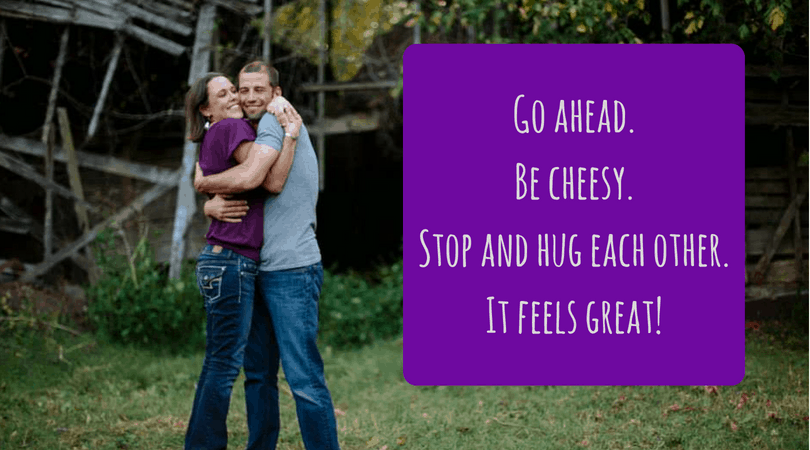
So we clearly laid out expectations. We had a “his, hers, and ours” routine. One night, the focus was all on Nathan – anything he wanted – it could be cuddling up and watching a movie, a massage, making love, or just having deep conversation as we hold hands on a walk. He would share if there is something he wanted to do, and it was my responsibility to make it happen – to set up the room for a massage, pour drinks, do whatever to pamper him. Then the next night, it would be me – same thing – I can call the shots, but Nathan would be responsible for initiating everything. And then on the “ours” nights, we’d work together to connect and create an evening that benefits us both.
Every evening, we still have that set aside as special together time. We draw a line in the sand for when our parent hats come off and we come together as lovers, not simply going over to-dos and parenting, but the two of us truly stopping the tasks and being together.
Be open with one another and clearly communicate your wants/needs. If you aren’t sure, be open about that as well, and learn together. Get to know who you are and what makes you feel the most connected to one another. This is such an important facet of your relationship. And if you don’t know yourself, its hard to expect your partner to know better.
Looking to experiment a bit more together in the bedroom? You can discover together the things you both enjoy. Check out this list of the best vibrators for couples. They might be a perfect addition to your sex life.
- Make it your routine.
Make your partner a priority and just as much an important part of your daily routine as exercise and meditation. Not all habits are bad – you may get into the habit of vegging out in front of the TV every night, or you can create a habit of daily yoga and/or other exercise. I want to stress the importance of creating a habit around your physical connection. It takes 28 days to break a habit…and a full 90 to really enforce a new routine to make it a habit.
If you make it just as much a part of your daily routine as exercise and brushing your teeth, it becomes an automatic part of your life that you miss when you don’t do it. If you exercise regularly, your body misses it and feels “off” if you don’t make it a priority. In the same way, if you create a habit out of physical connection with your partner on a daily basis, you will miss it if you don’t touch. Our physical intimacy is such a part of our daily lives we really notice if a day goes by that we don’t touch. It’s like missing that yoga or meditation that keeps us centered and focused – and connected – for the day.
- Choose love. Every day.
Every day we wake up, and choose to love each other. Like I said before, this isn’t a random thing that just happens to you. Love is a verb that must be acted on. As a marriage and family coach, I work with families to help them shift from chaos and reaction to a life of intention. The first step is to take responsibility for your actions – to recognize that you have a choice in how you react and engage in the world, and in your most intimate relationship.
When you wake up, think about what your goal is when it comes to your relationship. Do you want to connect? To feel love? To ensure your partner feels your support? Before every interaction with your partner, ask yourself, “what is my goal?” Make sure what you say and how you act matches your intention, and, every day, simply choose to act in love.
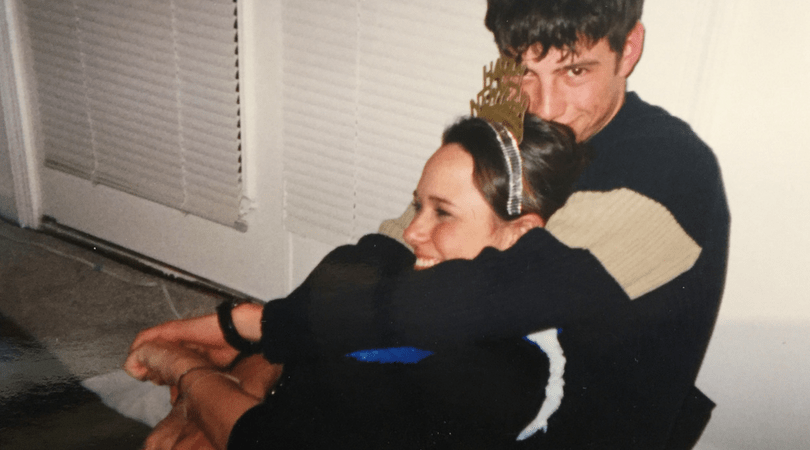
Author Bio: Ashley takes families from surviving to thriving by helping them uncover how “the uniqueness in each of us strengthens all of us.” She guides parents through identifying their strengths – and also their triggers – to live with intention and not simply reaction to the chaos of an ever-growing family. Through her podcast, blogging, coaching and personality “snapshots”, she provides tools and action steps to aid families in creating a life they love to come home to…not “one day”, but in the present moment.
Ashley, her husband (and podcast co-host), three unschooling daughters and dog are RVing the States full-time. They focus on authenticity, awareness, and embracing love in the present moment.
To find out more about marriage, parenting, minimalism, family travel, personality styles and “functional education”, go to www.MamaSaysNamaste.com

Pin this post to save for later!
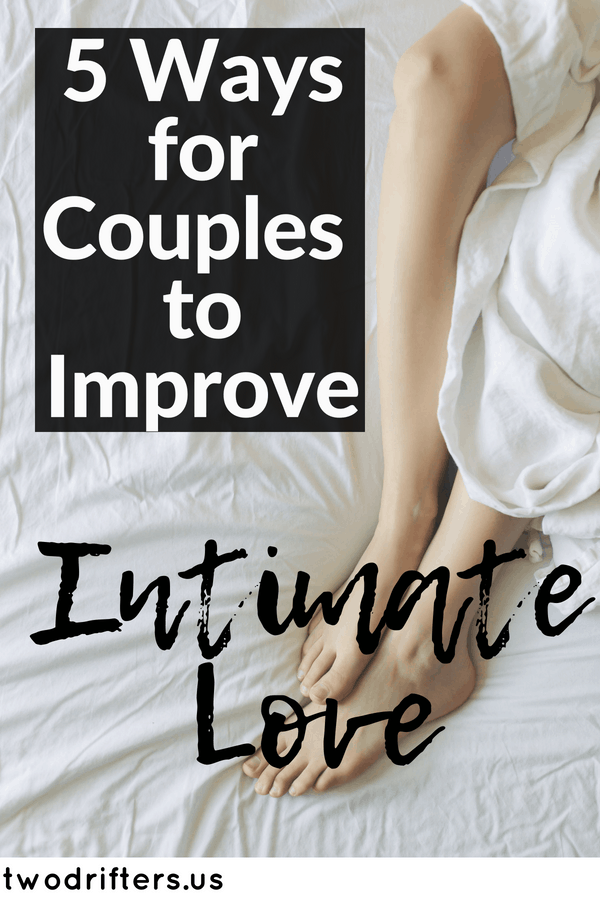

You might also like:
This article on the characteristics of an emotionally unavailable man is a guest piece by Emma Jones.
When I started dating Matthew, I knew something was not quite right from the very beginning, but I couldn’t put my finger on it. Our shared passion for dancing salsa united us, and I thought that the rest would come later as our relationship evolved.
As much as I was trying to respect his differences, some issues kept on emerging. It took me a while to understand what was happening until I heard the term ’emotionally unavailable man,’ and suddenly, it clicked: I had been dating one without realizing it.
I made a list of signs that will hopefully help you to identify if you are in a similar situation and decide if it’s worth continuing your relationship.
The Emotionally Unavailable Man – What the Heck is Going On?
*A quick interjection from Amy*
First, let’s define some terms. What is emotional unavailability? What is an emotionally unavailable man?
We asked a therapist to weigh in to offer some help in defining emotional unavailability. Here’s what Kendra A. O’Hora, Ph.D., LCMFT had to say:
Emotionally unavailable means that a person is unable or unwilling to connect with their own or others’ internal landscape.
An emotionally unavailable person will likely show signs of being evasive with intentional or emotional conversations and/or unwilling to emote or express emotion. But here’s an additional, key piece of it all: their capacity for empathy is seriously lacking.
I could talk about empathy for days but suffice to say it’s feeling with people.
When describing emotional unavailability, I prefer to contextualize the behavior in a relational sense. Rather than list off all these things he’ll be doing if he’s emotionally unavailable (cough cough avoidance), let’s unpack how it shows up in connection so that you can be well prepared the next time you’re texting, partnering, or connecting with someone.
When you’re in an emotionally unavailable connection you’ll feel three key things:
- Disconnected
Quick reminder: emotion is good, real good! Someone who is emotionally unavailable will likely stick to emotions that are safe for them (e.g., joy, pride, happiness, anger) and avoid emotions that feel unsafe (e.g., fear, shame, hopelessness). By prioritizing certain emotions he’ll naturally create distance between the two of you. In moments where you need to go deeper, connect with a specific feeling, or want to feel supported, he won’t be able to.
- Invalidated
Another layer of someone’s inability to connect and empathize is that when you are feeling they will gravitate to offering solutions and/or dismissing you. This is because connecting emotionally is not an option so they’ll quickly tell you what to do or offer that what you’re going through is not that bad. If you’ve ever been in one of these conversations you know it’s incredibly exhausting. All you wanted was support, love, and connection and you were left feeling stupid, inferior, and annoyed.
- Alone
As a result of feeling disconnected and invalidated you will likely feel alone. Friend, I’m sad you’re here. Not being emotionally supported in a relationship is painful and isolating. You can feel like you’re trapped, doomed, or stuck here forever. I ache with you.
Chances are you can pinpoint someone in your life whether colleague, sibling, friend, or romantic prospect/partner that is emotionally unavailable.
We’ll soon see that Emma was experiencing a lot of those signs in her relationship. Now back to Emma’s story!
6 Signs of Emotionally Unavailable Men

He won’t show his feelings
Matthew lived in his own world, and he never said what was on his mind. When he came back from work, he merely said ‘hi’ and retreated to his studio. He didn’t talk much about his day, his joys, or his concerns. If I asked about his work, he’d either say ‘It was good’ or that he was too tired to talk.
He was even more secretive when my questions were related to his feelings, and I could only guess why he was hiding them from me. Another red flag was that he wasn’t particularly interested in my feelings, either. Sometimes in his company, I felt like I was talking to myself.
Silence at our dinner table became the norm. I got used to Matt either looking dreamily into the void or mucking around with his phone during dinner. As soon as he finished his meal, no matter how much food I had remaining on my plate, he’d jump up from the table and start washing dishes in the kitchen, or would go back to his computer to play video games.
You aren’t his priority
One thing that hurt me a lot was that Matthew never made me a priority over his friends or other activities. While I wouldn’t expect it all the time, every once in awhile seemed fair to me. When I suggested doing something together over the weekend, he’d say he had to check with his mates first. If his friends suggested anything, he’d go along with them no matter what I had planned.
In my previous relationship, I used to do a lot of things with my boyfriend, but Matt was saying that spending some time separately and having your personal life is healthy. I rolled along with it at the beginning, thinking that I should accept the fact he is a different person than my ex.
Eventually, when our rare trips and weekends together became non-existent, and the only activity we did together was a quick meal at the local burger joint, I realized that a proper relationship should be more than that.
Matthew focused on work, his hobbies, or anything else that was on his horizon more than he ever focused on me. He would go miles to meet his friends, but he won’t inconvenience himself to modify his routine for me.
I didn’t feel important or appreciated, and the feeling of being special to somebody became a distant memory.
He’s emotionally insensitive
If I was sad or upset, he remained cold and didn’t show any signs of empathy. On the contrary, sometimes, he became frustrated and started picking a fight. Forget about a comforting hug and understanding, he wanted no part of it.
He called me childish when I was crying, and he was cutting me off when I wanted to talk about our relationship and my feelings, saying that he will speak with me when I start behaving like an adult. However, those conversations never happened, and it seemed like he was avoiding any topics related to feelings.
The thing was that he couldn’t handle his own emotions. Any small mishap or frustration would disbalance him to the point that he’d start acting unpredictably, and that scared me a lot. Matt would start kicking the doors when he couldn’t take my tears any more or leave the house when I needed his compassion the most. This was the biggest deal-breaker for me as emotional support is the foundation of any meaningful relationship.

He dwells on the past
Matthew had strong sentiments for his past that were related to his previous girlfriend. He was in a long term relationship before that lasted over ten years, so I could understand it was not easy for him to just forget all about it. The problem was that he often told me his stories about what he used to do with his ex, but he never did those same things with me.
In the beginning, I let it slide, thinking that Matt needed to heal his old wounds. A year later, I found myself being compared with his ex more than ever, often pointing out her superiority. I even discovered that they had been keeping in touch and having frequent calls. I am not a jealous type, and his ex lived in another country by then, but it was obvious that Matthew couldn’t let his previous relationship go.
Haunted by the past, he couldn’t focus on what was happening here and now. It felt like his ex-girlfriend, and his past relationship was perfect, and that I could never level up with his ex. She was skinnier, a better cook, a more challenging conversation partner. Her name would come up every couple of days, so it felt like I knew everything about her, and she shared the apartment with us.
He doesn’t want to commit
Up until I met Matt, I thought that I was the one who was hard to tame and make to commit. I couldn’t exactly see myself being married and with kids within the next few years, but Matthew took the concept of commitment phobia to a whole new level.
Even though he seemed to be serious about me, planning the future with an emotionally unavailable man was mission impossible. Asking if Matthew wanted to move to a bigger apartment with me or go on a trip the following year was pointless.
He managed to find all sorts of excuses (an unstable financial situation, insecurity with his job, the unpredictability of climate change) so he could avoid making plans together. The truth was that he did not see himself as a part of my plans.
Matt used to get panic attacks every time I mentioned even a short weekend getaway. It took me a while to realize that it wasn’t about his tight financial situation, but rather about his personal anxiety related to committing to anything.
He creates distance
As weird as it sounds, oftentimes, he was treating me like an enemy. He’d refuse things I was offering him, including my help and emotional support. He’d dismiss my ideas, even though he was advocating the same things himself a while ago. If I was saying ‘white,’ then he’d surely say ‘black.’
It didn’t take long for me to notice that Matthew was always enthusiastic about going to concerts or restaurants that his friends suggested, and he wasn’t too fussy about anything, while all of my ideas would get turned down. When we made mutual friends, we started going out more often, but only when those friends were inviting us out or going with us. That was his way to demonstrate the distance to me.
The way I interpreted his behavior back then was as self-assertiveness. However, when I think about it from the current perspective, it seems to me like a defensive mechanism in an attempt to mask his inferiority complex.
Why did I keep Dating an Emotionally Unavailable Man?
So, what was keeping me tied to Matthew for over two years, you may ask? Why did I continue dating an emotionally unavailable man even after realizing what was going on?
Every time I felt unappreciated or rejected and started rehearsing the goodbye speech, it seemed like Matt sensed that. He switched to the nice guy mode: he’d bring flowers, take me out to a fancy restaurant, and even listen to what I was saying. He’d make my heart melt, and I ended up scratching my head, wondering why on earth I was even thinking of leaving such a good man.
Guess what happened a couple of days later? Yep, that’s right: he morphed back into this cold, emotionally insensitive creature who lived in his own world and didn’t care about my existence. There was this constant feeling that I didn’t have him, and you know how it works: when you don’t have something, you always want it more.
These are just a few signs of an emotionally unavailable man that I encountered. I am sure that there can be more that might emerge depending on your situation and the partner that you are with. The bottom line is to spot the red flags as early as possible and ask yourself if it is worth wasting your time on someone who doesn’t want the same things that you do. Otherwise, you will end up feeling hurt, depressed, unimportant, and rejected. Nobody wants to be there, and I know better that it doesn’t feel good to end up like that.

How to Deal with an Emotionally Unavailable Man
What should you do if you’re in a relationship with someone who is emotionally unavailable?
A few more words from Dr. O’Hora:
I do want to offer a bit of hope though for those who are thinking they currently have an emotionally unavailable connection in their life. Not every person who is emotionally available is choosing to be that way.
I come across many people who have not been properly modeled emotional availability, nurturance, or support. Therefore, they default to what they know. This does not mean that this person doesn’t care about you. Please oh please do not mix this up. I hear a lot of women lament that their partner must not love them or care about them and it breaks my heart.
However, just because a partner is emotionally unavailable does not mean it is your job to teach and educate them on how to grow in this area. They likely need therapy and other resources that can help them learn to empathize and connect emotionally. And this will take years of effort and healing.
Let’s jump back to the person who is unwilling to grow or recognize their weakness in this area. This is the person who is choosing to be emotionally unavailable. If you’re in the talking, dating, or early partnering phase – it’s time for you to pause and look within: why are you connecting with someone who cannot support your emotional needs? What are they offering you that is taking priority over emotional rawness and health? And, is this the best long-term fit? These are great questions to begin sorting through.
About the author: Emma Jones enjoys observing and exploring the world around her and writing about her discoveries. Human relationships is her favorite topic, and she likes to analyze them from a psychological perspective. She is a contributing author at Thought Catalog, The Huffington Post, GoDates, and several other media outlets.
You might also want to check out some of our other relationship posts:
- We are Not Each Other’s Soulmates, But That’s Okay
- Do You Love Me? How to Stop Needing Reassurance in a Relationship
- 101 Toxic Relationship Quotes to Remind You You’re Not Alone
- The Best Relationship Advice for Couples
- 9 Straightforward Signs He Wants to Marry You
- 8 Real Relationship Goals Worth Striving For
- 50 Best Breakup Songs to Help Heal Your Heartbreak
When is the last time you enjoyed one of those much-deserved adult vacations? You know, a trip for just you and your significant other, no kids, no meetings, no obligations.
If you’re in a relationship, you probably know there are plenty of benefits that come with traveling as a couple—(and you definitely know the importance of intimacy.)
A romantic getaway or even a weekend spent in a new location can be an adventure, and the chance for some intimacy and some excitement provides a much-needed boost to your partnership.
But adult vacations, or, even better, nonstop travel with a partner, can reap you rewards that go beyond that passionate holiday.
According to research (of the official and “unofficial” kind, teehee) some important conclusions have been drawn: couples who travel together have better sex. Is it true? Read on for some compelling evidence.
Because Science
A study from 2013 confirmed what many frequent couples travelers already suspected: travel improves romantic relationships. But the survey also revealed some interesting details about sex.
Respondents who travel with their partner not only claim to be more satisfied overall with their sex lives (as compared to non-traveling couples), but also report that their sex lives improved AFTER travel and were even improved permanently.
Wow, way to go travel.
The numbers don’t lie: clearly couples who travel are finding that their adventures are enhancing their intimacy and sex life significantly.
So what is it about travel that makes everyone so damn satisfied?
Travel Brings Novelty
We’ve all heard the suggestion that when your sex routine has grown a bit “stale” it’s time to spice things up in the bedroom.
Well, instead of racking your brains to figure out exactly how to do that, get on that laptop and book a trip!
Discovering a fresh environment hand-in-hand is a simple way to put yourself into entirely new surroundings and circumstances. Things are different when you travel.
If you’ve got kids, your adult vacation gives you the opportunity to spend uninterrupted time with your partner. This might be enough of a novelty in itself.
Throw a romantic hotel into the mix and you’ve got plush new bedding, an alluring whirlpool bathtub, and the champagne chilling in the corner. These little touches equal instant excitement, and it’s easy to get swept away in your own passionate love affair.
Plus, there’s something about hotel sex that feels a bit more verboten.
Fewer Distractions
At home, it’s far too easy to get sucked into Netflix, checking work email, or doing just one more chore. It’s more of a challenge to unplug and focus all your attention on your partner. But travel creates these opportunities for you.
Not only does it give you a much-needed break from those everyday distractions, but the novelty, the adventure, and the mindset of travel all bring your focus to that other person in your space.
When it comes to being intimate, this means you’ll be more in tune with each other physically, spiritually, and emotionally. A more powerful sexual experience is sure to ensue.
Shared Experiences Bring You Closer
Of course sex isn’t just about the physical passion. It’s so much about the emotional intimacy between two people. When you’re totally comfortable with someone and know them incredibly well, that closeness equates to the best kind of sex there is.
It’s possible for all types of couples to be close, but there’s a certain intimacy borne of traveling with your partner.
Was he there holding you as you witnessed that Grecian sunset? Wasn’t she the one who picked out that perfect, hidden restaurant for the best dinner of your life?
Remember when you missed the train and hitched a ride in the back of a livestock truck? Your partner was there with you.
Those moments big and small, hilarious and touching, are things you can’t fully share with anyone else than the person who experienced them with you. If that doesn’t inspire closeness, we don’t know what does.
Couples Who Travel are More Adventurous
Sometimes the best sex is about being fun and experimental in the bedroom. Who better to grab the bull by the horns (no innuendo intended we swear!) than a traveler?
Couples who travel have built up their confidence by discovering the world find that everything else is affected as well.
There’s a serious level of independence gained by traveling (whether as a couple or solo travel) and this translates into multiple areas of your life.
It stands to reason, then, that becoming more self-confident and daring would yield better sex for you and your partner.
Travel Builds Relationships – Beyond Sex
Since this blog is all about traveling as a couple, we know firsthand how much traveling has added to our marriage.
Sex is a byproduct of these other gains, in our opinion, because while a rockin’ sex life can be important for a lasting partnership, things like trust, compassion, respect, commitment, and a deep sense of love mean even more.
Because travel encompasses both the good and the bad at times, it forces you to grow in many ways. As a couple, it teaches you how to compromise for your wants and needs and to honor those of your partner.
It helps you learn how to share space (sometimes even a very cramped space!) and how to handle stress—the type of stress traveling brings, which is different than day-to-day hassles at home.
And although it might sound corny, traveling together successfully shows you that you can achieve things as a team. This strengthens your partnership and helps you to grow individually—both of which will help to enhance your relationship.
Any Kind of Travel
The good news is, it isn’t just long-term travel that benefits couples. While it’s nice to get away as often as possible, even a vacation or weekend excursion here and there can help.
Nor does it have to be luxury travel.
While there’s something inherently sexy about chocolate-covered strawberries and a balcony with an Eiffel Tower view, there is equal passion to be found on a wilderness camping trip.
In fact, some of our favorite moments from traveling together weren’t those in fancy hotel rooms, but those in which we were cuddled up in the back of a cozy campervan, just us, a bottle of wine, and the stars.
Fancy its time for you to book an adult vacation? Wherever you head, we’re sure the sparks will be flyin’.

Amy Hartle is the author of Do You Love Me? How To Stop Seeking Reassurance in Relationships, a book on reassurance seeking and relationship anxiety. Both her book and this blog are born of personal experience; Amy shares expert relationship advice from the lessons learned during her own 10+ years with her husband, as well as couples travel tips and romantic getaway recommendations, all gleaned while traveling the world together.
